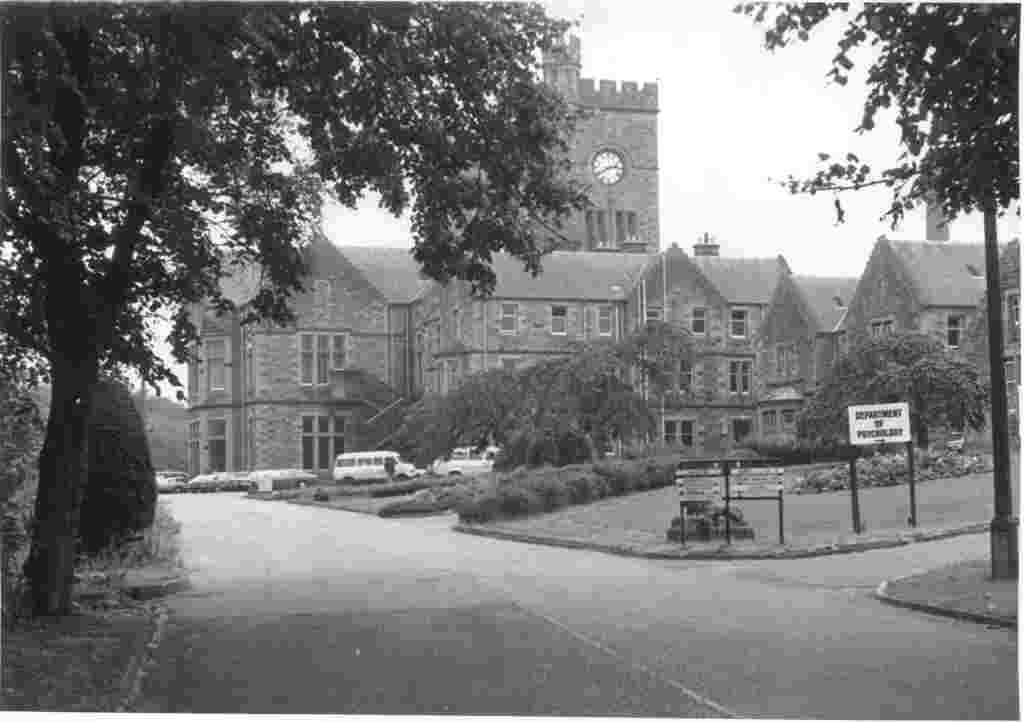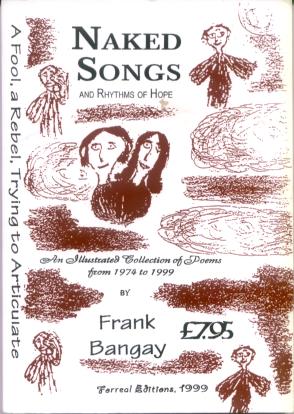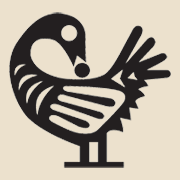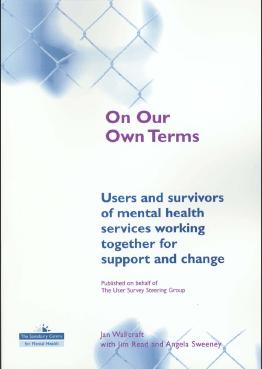1950s
Out of Rampton
early 1970s
A journal of SUMP days
1974
Frank Bangay - Minstral of the movement
1977/1982
A Mad People's History of Madness
1977/1979
Anne Plumb - Archivist of the movement
1980s
Joan Hughes - Historian of the
1970s movement
Summer 1990
"The Ex-Patients' Movement: Where We've Been and Where We're
Going"
by Judi Chamberlin
1996
Peter Campbell - Reflecting on the movement
1996
The Health Through History
Initiative
1999 Disability Studies in
Canada
2000-2003
On Our Own Terms
2004/2005
Survivors History Group - archives
2005-2006
Survivors History Group
manifestos
2007 Survivor History
web
2008/2009
Survivors History internet
forum
October 2010
Oor Mad History - The book
About twenty patients began writing letters and staff complained that
Peter's campaign meant they had to spend all their time reading (and
censoring) patients letters. Several time, Peter was warned:
This much battered copy is the property of Andrew Roberts. - It was read
and marked by fellow patients at
Ingrebourne in 1963 and later.
- "The
signatories to
the petition are the Foundation and Permanent Members of
SUMP" [Scottish Union of Mental Patients - see
mental patients unions]
Robin Farquharson is member number 00034 in the SUMP membership
list. He is the first not from
Hartwood. Under "hospital" it says
"
Gartloch (7) transferred to Epsom". The story
I remember being told is that Robin was confined (on this occasion) after
succesfully ordering a (military?) aeroplane - or aeroplanes.
Survivors' histories
Mental patients make history
Mental patients write histories
We always have and we always
will
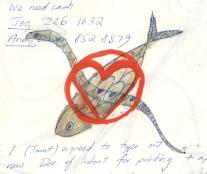
Out of Rampton

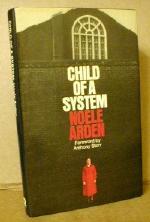
about 1953
Noele Arden told her fellow inmates in
Rampton that
"I'd write a book and let the outside world know what went on
behind those high walls and locked doors. Although I meant it, I hardly
thought I would ever get the opportunity to do so"
Child of a
System p.62
Her book was published in 1977
Peter Whitehead advised other patients to
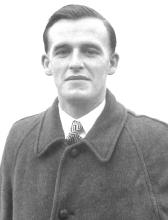
January 1955
Peter Whitehead in solitary confinement at Rampton
"I decided I was being wrongfully shut away, because I knew I
wasn't mentally defective, and in spite of what had happened at Farmfield,
I was not violent. I knew that I must go on believing this, and go on
hoping that one day I would be set free. No matter how long I was
imprisoned
in Rampton, I was determined never to give up".
"Write letters. Get people outside interested in you. Tell them
you've been wrongly shut away. If you stay quiet, nobody will lift a finger
to help you, however long you stay here"
"Carry on like this, and you're heading straight for
trouble"
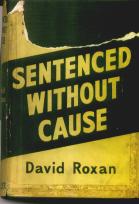
1958
David Roxan's Sentenced Without Cause told the story of
Peter Whitehead's successful struggle for freedom
The Scottish Union of Mental Patients

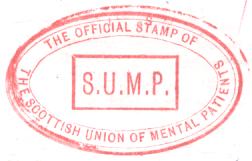
26.7.1971
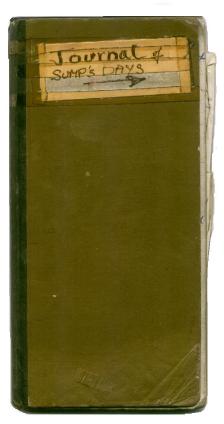
SUMP (Scottish Union of Mental Patients).
Tommie Ritchie's "Journal of SUMP Days" begins Friday
7.4.1972,
but the prefatory note says "We are late in the starting of recording
SUMP's activities - But the Manifesto is only half finished and not yet
recorded. Moreover we have had no General meeting yet." - See also
26.7.1971
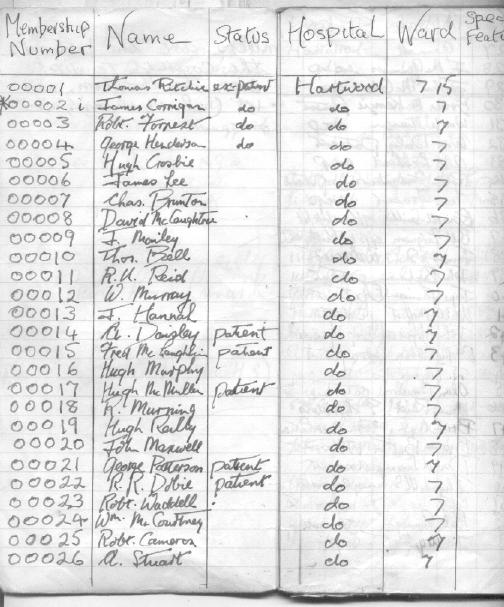

Frank Bangay - Minstral of the movement
Frank Bangay's collected works,
Naked Songs and Rhythms of
Hope - An Illustrated Collection of Poems from 1974 to
1999 was
launched at Mad Pride's "first ever gig" on June 20th 1999.
Depression, poetry, recitation and publication
In his early twenties, Frank, started suffering from severe depression and anxiety. Expressing himself through poetry helped him to disperse the gloom. He discovered the Troubadour Poets who held Monday night poetry evenings at the Troubadour Coffee House in Earl's Court, and he began reciting his poetry there. One of his ealiest poems, "Fear", was published by Troubadour Poets in late August 1974: It is deeply personal and vulnerable.
"you tell me that I frighten you, Well I never intended to... I'm not a tough man... there are many times when I am afraid... afraid of isolation ... afraid of my superiors... afraid of love... And sometimes I'm frightened of you my friend."
Springfield Hospital
Frank's 1985 poem "Food and Shelter" relates to experiences in 1976 to 1978 and
"the revolving door system that we can get caught up in once we enter the psychiatric system".
Frank was a patient in Springfield Hospital, Tooting, South London. Not all his experiences here were negative. He helped Kieran Brown, an Occupational Therapist, to produce Springfield Words, a magazine published by the hospital. It contained "Spring is Rising", a poem of conviction that "peace in our hearts" is "more than a dream" if we "sing out loud" and "make it real".
In 1979 Frank helped to organise a half-hour of poetry and songs based round life in Springfield Hospital, featuring Kieran, himself and Dave Dorling, who was also a patient in the hospital. It was staged at the Troubadour and "quite well received".
Music, poetry and politics
At the end of the 1970s, Frank collaborated with musicians in the Fighting Pigeons Band. "Park Song" one of his most beautiful poems, was written as lyrics to one of their songs. "I saw you crying in the park today. I nearly felt strong enough to cry with you"
Prompt - CAPO
Frank first read PROMPT booklets in 1979.
Music and poetry events were organised by Frank Bangay to raise money for PROMPT and CAPO. Some of these were at The Metropolitan, a public house in Farringdon. Many activists were brought together at these event.
|
Peterson, D. 1977 The literature of madness : autobiographical writings by mad people and mental patients in England and America from 1436 to 1975 Ann Arbor, Michigan Thesis - Stanford University, 1977 [Bibliography: leaves 571-595]
1982 A Mad People's History of Madness compiled by Dale Peterson. The British authors included are Margery Kempe, George Trosse, Alexander Cruden, Samuel Bruckshaw (1774), William Cowper, Urbane Metcalf, John Thomas Perceval, Marcia Hamilcar (1910), Thomas Hennell (1938), John Cunstance (1952) and Morag Coate (1965) |
Anne Plumb - Archivist of the movement
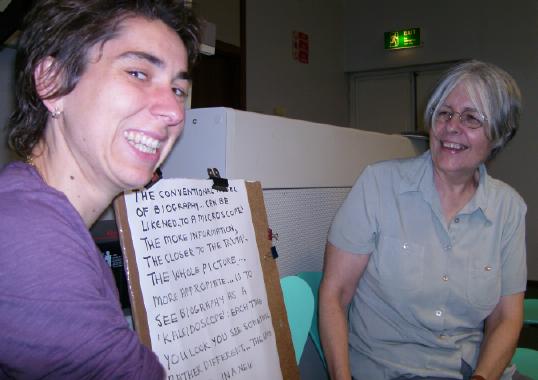
|

|
Helen Spandler (left) and Anne Plumb (right) are two of the co-founders of the Greater Manchester Survivor History Group. This picture was taken in September 2008. Anne began to collect books, pamphlets and other documents about the movement in the 1978/1979. Because she keeps her collection in good order, cataloguing and analysing it, her Manchester archive is now one of the most important archives of the survivor movement.
|
Anne Plumb by Anne Plumb
Anne Plumb is a survivor activist and member of a Survivor History Group. In 2005 a group of activists, concerned that their history could get lost, met and set up this group in association with a webpage Time Line, managed by Andrew Roberts, and linked to an internet forum Anne also has a personal archive: Ear to the ground; Survivor Voices. This an archive, organised chronologically, of pamphlets, flyers, booklets, press cuttings, books authored by people within the mental health movement. . from around the late 1970s to 2000. It is in two parts; Survivor Organisation and Survivor and Ally Action. The collection began with a booklet by the Manchester Mental Patients Union on Your Rights in Mental Hospital (about 1979) and a magazine, State and Mind from the US, which included on article on Judi Chamberlin's book, On Our Own. Patient-Controlled Alternatives to the Mental Health System (1978), picked up in Manchester's Grassroots bookshop in the late 1970s. In the mid 1980s, Anne joined the network Survivors Speak Out. She kept items from Survivors Speak Out newsletters and picked up others at stalls set out at Survivors Speak Out AGMs including the first copy of Asylum magazine (to which she continued to subscribe) Becoming a trainer with a small local collective, DATA (Distress Awareness Training Agency) which included doing work with the Social Work department at Manchester University in the late 1980s/early 1990s, she added books and articles. She also subscribed to the Hearing Voices Network newsletter, which had its beginnings with North Manchester Community Workers, retaining these. She came to Rochdale in 1970 following 18 months of emotional and mental crisis while at university that placed her in hospital on several occasions. Anne has some material on Mad Pride but identifies as a mental health system survivor rather than a mad prider. Married to Ken Lumb, an early member of the Union of the Physically Impaired Against Segregation (UPIAS) (founded 1974) and a founding member of the Greater Manchester Coalition of Disabled People (GMCDP) (1985), which bought activists together from the various boroughs including Rochdale, where Ken was particularly active in the 1970s/1980s. Anne has an archive of the campaigns he was involved in and related material from the early 1970s to mid 1980s along with Coalition magazines including those he edited during the last decade. |
Joan Hughes - Historian of the 1970s movement

|
Joan Hughes (1928-2008) drafted a movement outline in the early 1980s and also recorded a confidential autobiography of her experiences at the heart of the Mental Patients Union in the early 1970s

|
| Summer 1990 "The Ex-Patients' Movement: Where We've Been and Where We're Going" by Judi Chamberlin is mostly about the movement in the United States - Link to online copy |
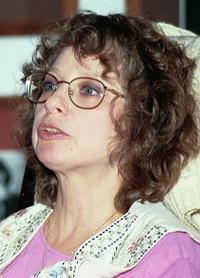
|

|
1996 Peter Campbell and reflective history
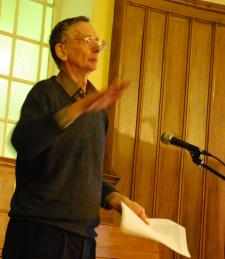
|
|
Peter Campbell, a founder of
Survivors Speak
Out
in 1985 has written many
reflective articles on the movement.
in 1996, his "The history of the user movement in the United Kingdom" was published as chapter 26 in the Open University reader Mental Health Matters. This is the classic reflective history of the United Kingdom movement. By reflective I mean that Peter does not simply recount history, but does so as a reflection on its significance for the movement.
|

|
The Health Through History Initiative
History is more than a research method for survivors. Tower Hamlets African and Caribbean Mental Health Organisation (THACMHO) was started by mental health service users in 1996. Its projects include "The Health Through History Initiative".
One of THACMHO's publications is Power Writers and the Struggle Against Slavery - Celebrating five African writers who came to the East End of London in the 18th century.
Earlier this year (2010) F.E.E.L. (Friends of East End Loonies) hosted a "Pageant of Survivor History", the script for this was written by the Survivors History Group and it began with readings from the autobiography of Ukawsaw Gronniosaw, one of the African writers who was considered foolish or insane.
1999 School of Disability Studies established in Toronto, CanadaThe School of Disability Studies at Ryerson Polytechnical Institute (University from 2002) developed a History of Madness course. Two ex- patients, David Reville and Jim Ward, took over the course in 2004.
Other survivor features of Toronto
|

|
2000-2003 On Our Own Terms
On Our Own Terms is the most important printed empirical contribution to the academic history of the survivor movement so far. No one else has attempted anything approaching it.
The whole research project was collectively controlled by survivors. Depite its academic credentials it is often not noticed by historians outside the survivor history movement.
The On Our Own Terms research is the immediate background to our own work and several of the people involved in it are active members of the Survivor History Group. The Survivor History Group later used its historical table as one of the starting points for our web history of the movement.

|
2004/2005 Survivors History Group Archives
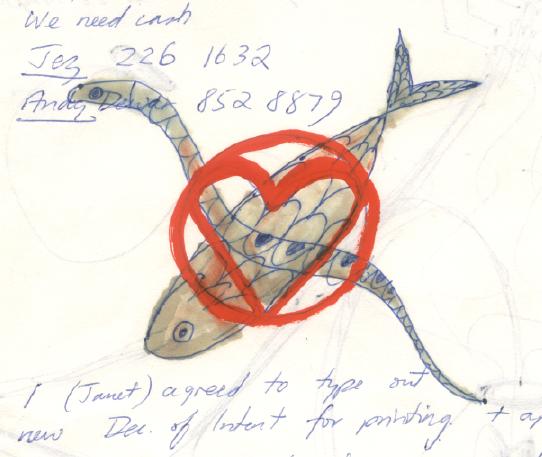
|
Survivors History Group - archives
Survivors History Group began in 2004/2005 as an archival project to rescue the physical history of the mental patients' movement from the skip.
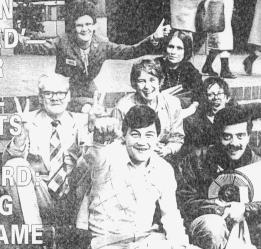
|
|
The first artifact we preserved (as a group) is a video of a presentation
called
"Life after Mental Illness"
that members of Glasgow Link Clubs made
at a Mind Conference in 1984.
This is believed to be the first time that mental patients made a collective presentation to a Mind Conference.
|
Individually, some of our members preserve extensive archives in their own homes. These include the records of the Scottish Union of Mental Patients (1971-1972) the Mental Patients Union started in London in 1973, Survivors Speak Out (1986-2009) and the United Kingdom Advocacy Network (1991-present).
We are seeking ways to preserve such collections for future public access.
In the meantime we have adopted a policy of listing important archives in a way modelled on the idea of listed buildings.

|
Survivors History Group manifestos
A summary manifesto drafted in July 2005 became the basis for a fuller statement in January 2006
|
The short manifesto said that
We are to be survivor-led and operate as an independent group, but will willingly cooperate with interested allies. We did not want to impose a history on others, but to find ways in which the full diversity of user/survivors can record and share history. We also wanted to draw on the different forms that survivor history has taken The long manifesto commented on the construction of history to the exclusion of the patient and on the need for a space in which patients could make our own history. Our "basic founding principle" was to be that "service users own their history". We would "acquire materials from the full range of people involved in the mental health service user movement" "develop a publications policy" and "make as much material as possible available electronically". |
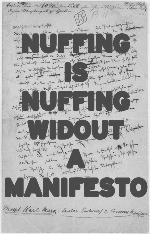
|

|

|
We adopted some lateral thinking to adapt Peter Beresford's founding vision to our practical means.
Our visitors come quietly in by the world wide web and sometimes email us with contributions to the exhibits. But the web site is an an archive and a museum. It is copied every six months or so by the UK Web Archive for perpetual preservation. Anything we put on it will be preserved as securley as a book in the British Library or and exhibit in the British mueseum.
The website was adopted by the group in June 2007. The "studymore" site was created to enable archiving by the National Web Archive and this began the following month.
The pictorial fish - heart - snake logo was adopted from the archives of the Mental Patients Union at the same time.
The website includes:
The story/stories of the movement in the form of a timeline.
Individuals' stories inter-related to the story of the movement.
Detailed information boxes about individual events or groups.
Indexes of survivor history related features in magazines such as Asylum and Open Mind.
Reviews and summaries of books and articles about survivor history.
Copies of articles.
Copies of documents and images from the movement's history.
Lists of paper records about groups. Lists of books and pamphlets and records of where papers, books and pamphlets are preserved.
| The web page began with documentation of material about the 1970s in the care of Andrew Roberts, but a multitude of other contributors have added to the story and the site is now a collective history of the survivors movement and its context which everyone is invited to contribute to. |
Survivor History internet forum
http://groups.google.com/group/survivor-history/
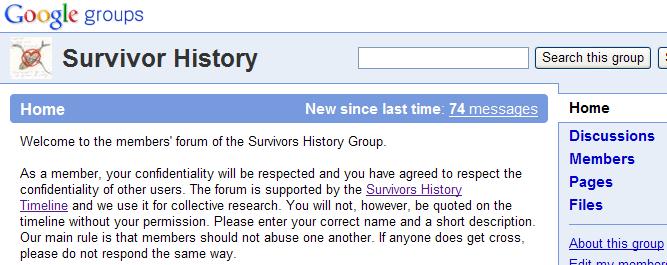
|

|
October 2010 - Oor Mad History - The book
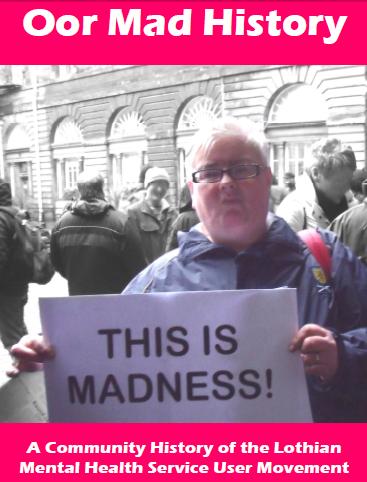
|
1.6.2007 David Reville spoke to CAPS (Consultaton and Advocacy Promotion Service) in Edinburgh. Wednesday 16.6.2010 Birmingham seminar. Friday 1.10.2010 Launch of book. |

